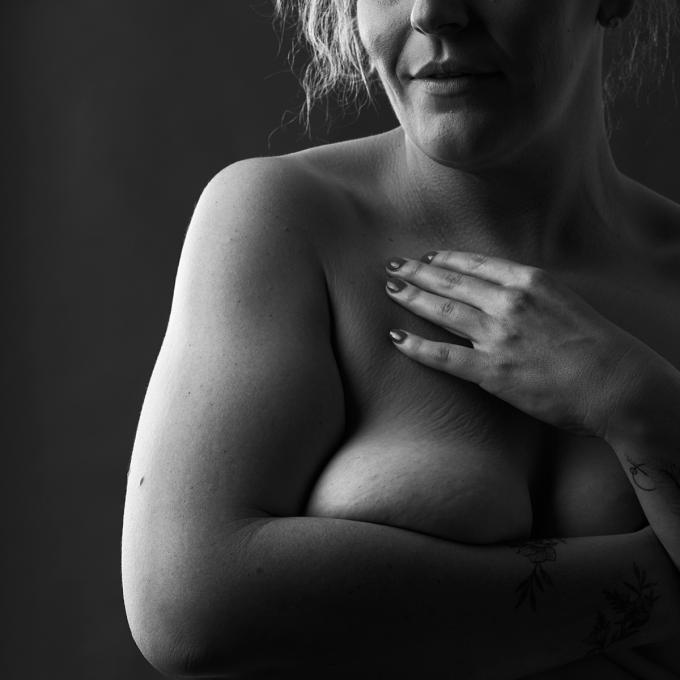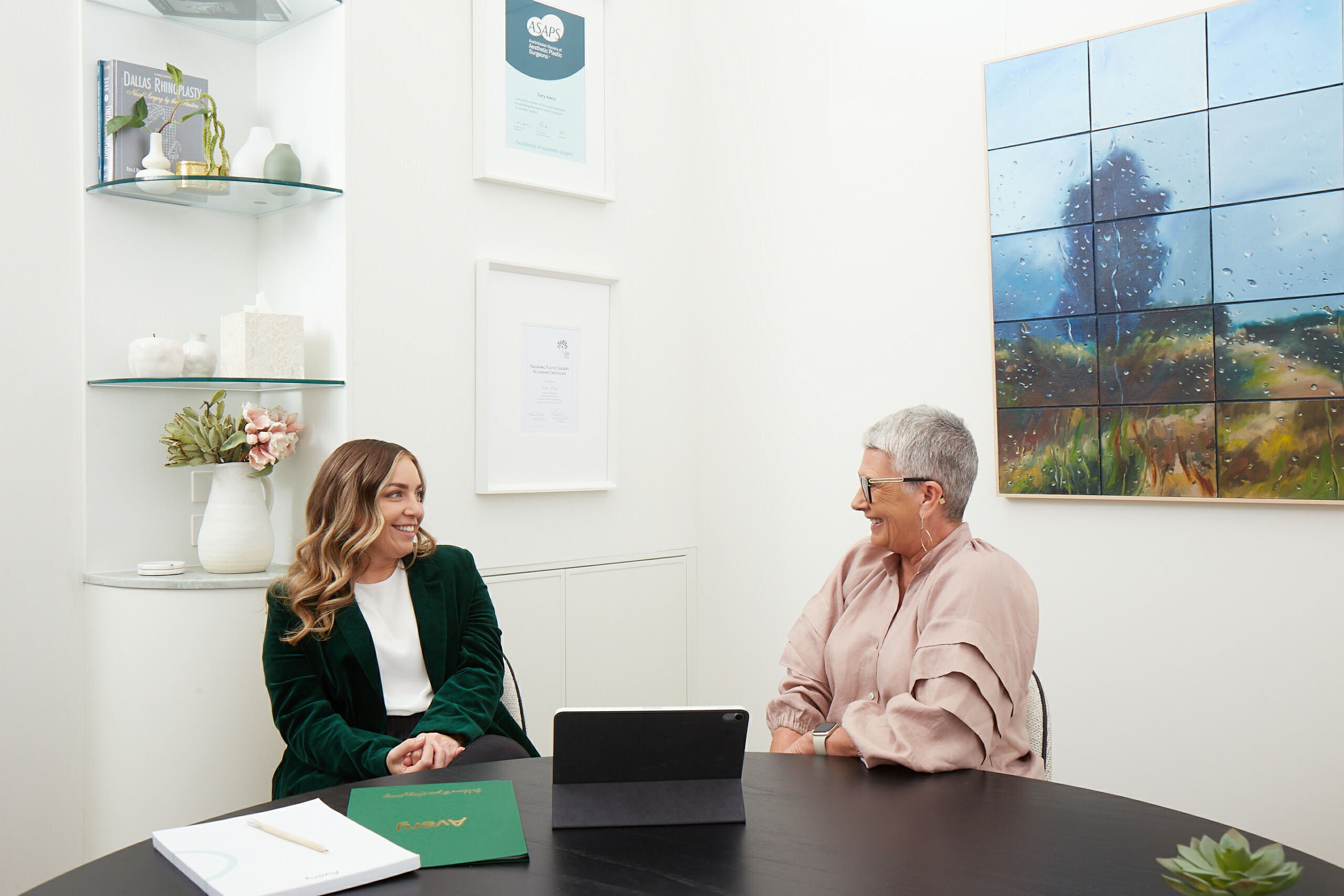
The most prevalent reason for nipple correction surgery is inverted nipples. This can be present at birth, and occurs when the milk ducts retract or remain shortened during breast growth, pulling the nipple inwards.
Nipple inversion can also be caused by a number of non-congenital factors including physical trauma, disease, and breastfeeding and can cause functional problems such as irritation, rash and discomfort.
Please note that individual results will vary depending on the individual, their genetics and lifestyle factors, and all surgeries have associated risks. Before proceeding with any surgery, it is advisable to seek a second opinion from an appropriately qualified medical practitioner such as a Plastic Surgeon. Dr. Gary Avery (MED0001633092) a registered medical practitioner, with specialist registration in Surgery – Plastic Surgery. Dr Avery is also a member of the two leading professional associations for plastic surgeons in Australia, Australasian Society of Aesthetic Plastic Surgeons (ASAPS) and Australian Society of Plastic Surgeons (ASPS). Their websites provide additional information regarding plastic surgery in Australia that you might find useful, please visit ASAPS and ASPS.
I just wanted to say the biggest thank you for taking me on as a patient. You made this journey the best one I could have ever asked for.
The aim of nipple correction surgery (also known as nipple reshaping surgery) is to increase the projection of one or both nipples. Depending on the severity of the inversion, the procedure may require transection of milk ducts, which could potentially preclude future breastfeeding.
Nipple correction surgery can reshape the size of the nipples and areolas to reduce their size and make them look more symmetrical.
Nipple correction surgery may also be combined with other surgical procedures on the breast such as breast lift, breast reduction and breast augmentation.

Dr Avery will assess your health and medical history to ensure any surgical procedure you are considering is a safe and appropriate choice for you.
Patients considering any form of breast surgery will need to come in for a consultation with Dr Avery to discuss your expectations, along with the surgical options for how these can be achieved. During your consultation with the Avery team, we will ensure that the surgery you are considering is the appropriate choice for you.
At Avery, we welcome the opportunity to have an open conversation with you to understand the changes you are looking for with surgery. Our patients’ stories matter a great deal to us.
Wherever you are on your personal journey, we would like to assist you. Your reasons for having surgery and your expectations from surgery are important conversations to have before undergoing surgery. Dr Avery will also assess your health and medical history to ensure any surgical procedure you are considering is a safe and appropriate choice for you.
Your Nipple Corrective Surgery
Your GP or another specialist that knows you well must make a referral to Dr Avery. The decision to have a consultation may be made after talking with family or friends or following your own research into plastic surgery and Dr Avery.
The purpose of your initial consultation with Dr Avery is to discuss your motivations for surgery and expectations from surgery. It is an opportunity to openly communicate what you want to change, alleviate or remove. We will discuss any concerns you may have about your potential surgery and its outcome. We will also collect information that is specific and tailored to you, to add to the knowledge you acquired through your research outside of the consultation process.
When you arrive at Avery, you will check in with our Care Team and complete a medical history form, if not already completed. We encourage you to bring a supportive family member or friend who can remain with you throughout the consultation if you like, and be a sounding board during your decision-making process following the consultation.
The consultation with Dr Avery will include an examination of the area of your body that you are concerned with and considering changing. Our aim will be to determine if plastic surgery can achieve what you hope it will, and if so, what specific plastic surgery procedures will address your concerns and meet your expectations in a realistic way.
Plastic surgery procedures can impact physical appearance and there may be a psychological response to the changes in your body after surgery. Besides the reasons for having plastic surgery, it is important to be fully aware of any potential limitations of the operation and how they apply to your unique situation. This includes the risks of having surgery and all of the possible complications that can occur after surgery, and what can be done if these occur.
We will discuss what the surgery involves, how it relates to you specifically given your uniqueness and current state of health, what the possible risks of the surgery are, and then decide if having the surgery is a safe and appropriate choice for you as an individual.
Your consultation will also include a discussion of the estimated financial implications of having this surgery or surgeries that were discussed with Dr Avery.
After your consultation, our Care Team will be there to talk through any further questions you have, including the cost of the surgery.
At Avery, our goal is to ensure you are equipped with the knowledge needed for you to feel empowered throughout the decision-making process, surgery and post-surgery.
There are many different surgical techniques used to correct inverted nipples. Dr Avery uses a technique which involves making a small incision around the base of the nipple and releasing the tension on the milk ducts, which allows the nipple to sit more naturally.
Depending on the severity of the original condition of the nipples, nipple correction surgery generally takes between 30 minutes to an hour and it is performed under a local or general anaesthetic.
Nipple correction surgery alone can be performed as a day surgery procedure, it may also be combined with other surgical procedures.
As with all surgical procedures, nipple correction / reshaping surgery does have risks, despite the highest standards of practice. It is not usual for any surgeon to outline every possible side effect or rare complication of a surgical procedure. However, it is important that you have enough information about the most common risks to fully weigh up the benefits, risks, and limitations of surgery.
The following possible complications are listed to inform and not to alarm you. There may be other complications that are not listed. Smoking, obesity, and other significant medical problems will cause greater risk of complications.
Some general risks and possible complications of surgery include, but are not limited to the following:
- Heavy bleeding from an operated site. This may require a blood transfusion.
- Infection that may require treatment with antibiotics or further surgery in some cases.
- Allergic reaction to sutures, dressings or antiseptic solutions.
- The formation of a large blood clot (haematoma) beneath an incision site may require further surgery.
- Complications such as heart attack, pulmonary embolism or stroke may be caused by a blood clot, which can be life threatening.
- Pain, bruising and swelling around the operated site(s).
- Slow healing, often related to smoking or diabetes.
- Short-term nausea following general anaesthesia and other risks related to anaesthesia.
- Tissue cannot heal without scarring and that how one scars is dependent on individual genetic characteristics. Dr Avery will do his best to minimise scarring but cannot control its ultimate appearance.
- Smoking or using nicotine products during the 3–4-week pre-operative and post-operative periods is prohibited as these could dramatically increase the chances of complications.
- All medications I am currently taking, including prescriptions, over the counter remedies, herbal therapies and supplements, aspirin, and any other recreational drug or alcohol use can affect the safety of my surgery.
- There can be no guarantees about the results of any surgery.
Some specific risks for nipple correction / reshaping surgery include, but are not limited to the following:
- Bleeding / haematoma requiring surgery
- Infection
- Pain and discomfort
- Asymmetry of nipples
- Inability to breast feed
- Long term alteration to contour and appearance
- Loss of nipple sensation
- Scarring
- Further surgery required (revision surgery)
- Unsatisfactory result
- Further recovery time if further surgery is required
- Allergic reactions to tape, suture material, topical preparations
The Australasian Society of Aesthetic Plastic Surgeons (ASAPS) has further information about nipple correction surgery including the possible risks for this surgery.
Nipple correction surgery is usually performed as a day surgery procedure. A specialised dressing will be in place to avoid excess pressure on the nipple following surgery and it is recommended to limit physical activity while you are recovering.
There may be some bruising, swelling and discomfort, which generally subsides within a few weeks after the operation. Avoiding excessive pressure on the nipple is required for 6 weeks following surgery.
A customised pain relief program will be created for you and issued before you leave the hospital. If circumstances change at any stage during the recovery period, pain medication can be adjusted accordingly.
A dressing or wound ointment will be applied to the wound in the first few weeks following surgery. Generally, scars following surgery to the nipple and areola will heal in a satisfactory manner and will be minimally visible.
The financial aspects of your surgery are as important as the medical elements when planning for surgery. At Avery, the surgeries we offer fall into three different financial categories: Self-funded – aesthetic surgery; self-funded – plastic and reconstructive surgery; and health insured – plastic and reconstructive surgery.
To make sense of these three financial categories, we have created a detailed price guide to help you understand what may or may not be covered by your health insurer/Medicare and your out of pocket expenses.
To download this guide, please click here.
For more information or to book a consultation, please contact our team on 02 4002 4150.
Nipple Correction Surgery FAQs
The nipple is pulled into the breast instead of pointing outward. Some nipples can be pulled out but fall back into the breast. For some, it may not be possible to pull the nipple out at all.
Inverted nipples can be a congenital condition with no particular reason or cause identified, or it may arise as a result of disease or trauma. Most often the inversion will occur with no obvious cause and at any stage. Whatever the cause, an attempt can usually be made to correct nipple inversion.
An incision is made at the base of the nipple and the breast ducts that are often responsible for pulling the nipple in towards the breast. Dr Avery then lifts the nipple and areola from the breast, stretching them and then suturing the nipples into their new position. The procedure is typically completed as a day stay procedure and takes less than one hour.
Scarring will vary between patients. The size and location will depend on the type of surgery had, as well as your skin type. Usually, the scar will be red at first, but fades over time, finishing a little lighter or darker than the surrounding skin after 12-18 months.
Typically, if your surgery is considered cosmetic in nature and does not have a related item number, private health insurance does not cover this surgery. If the surgery is being considered to address significant developmental differences, changes from previous trauma, or to relieve nasal obstruction, then a Medicare item number may apply to the surgery and there may be some cover of this procedure through private health insurance.
Sun exposure can adversely impact early wound healing and have an adverse effect on the pigmentation and long-term quality of you scar(s). All scars should be protected from sun until they are mature, which may not be until one-year post-surgery. A spray tan is okay after a few weeks (once the wound is healed).
Pain following surgery will vary depending on the extent of surgery. Pain immediately after surgery may be reduced by the use of local anaesthetic at the surgical site given during the surgery. The pain will also be managed with tablets or injections as required. Physical measures such as the dressings and supportive garments as well as limited movement and possibly ice packs will all help minimise any pain. Pain is usually well tolerated within a few days after surgery with all these measures. If your pain is increasing following surgery this is usually a sign that you may need a review to ensure your recovery is proceeding as expected.
Dressings and supportive garments will offer support to the wounds and the areas of your body that are still recovering. You will be also be advised to restrict excessive movement of the surgical area in the first two weeks after surgery. A good general rule throughout your recovery is if an increase in movement or activity does not increase any discomfort or swelling, then it is probably safe and this gradual progression back to ‘normal’ will be encouraged.
Male Breast Reduction
Breast Augmentation
Breast Reconstruction Surgery
View all services
Your initial consultation
During your initial consultation we welcome the opportunity to have an open conversation with you to understand the changes you are looking for with your surgery and talk through any concerns or specific goals you may have.
Your initial consultation will include an examination of the area of concern and we'll work with you to determine if plastic surgery can achieve what you hope it will, and which specific plastic surgery procedures will address your concerns and meet your expectations in a realistic way.
The procedure may be combined with other aesthetic surgical procedures such as breast augmentation, breast reconstruction or male breast reduction.

Anne-Marie, our Care Team Manager - and member of our Care Team.